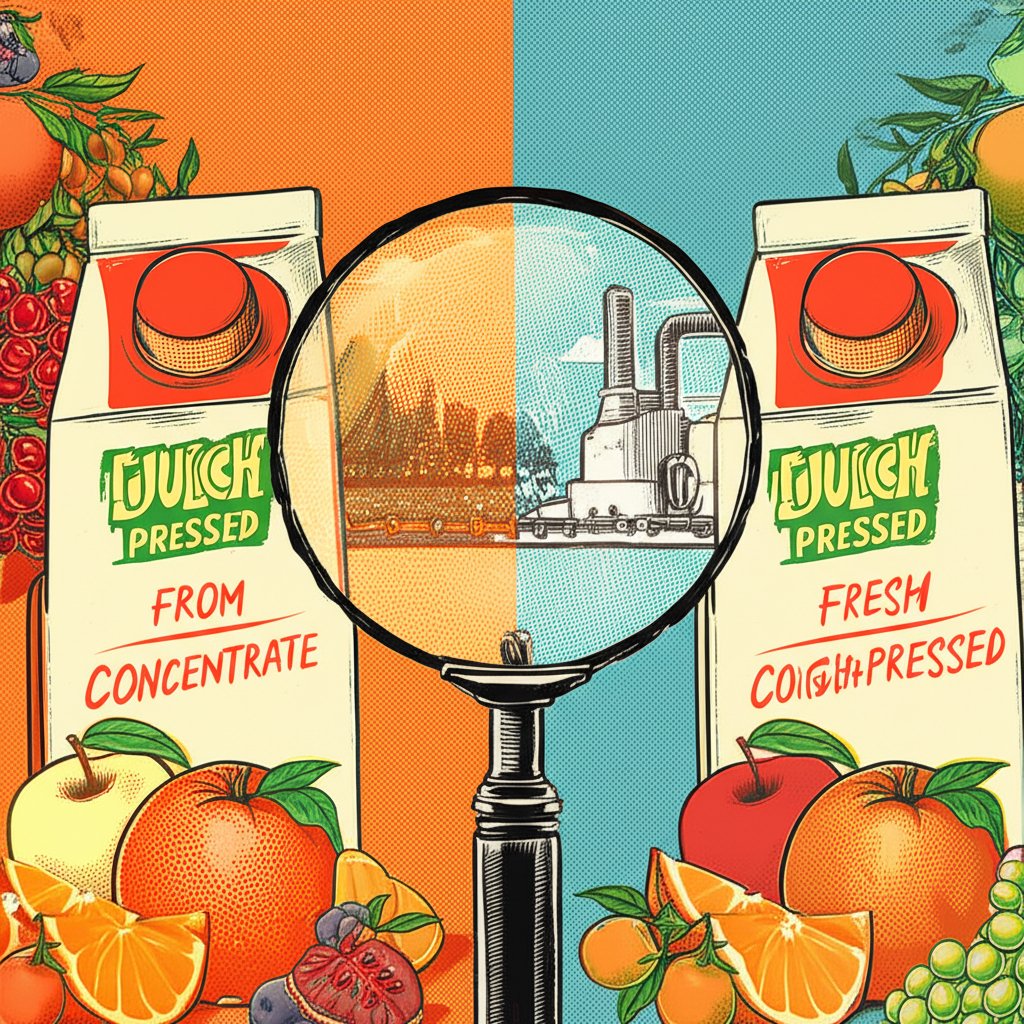Reaching for a refreshing glass of apple juice seems like a healthy choice, but understanding the apple juice nutrition facts is key before you gulp it down. Is it really as nutritious as an apple, or are you mainly getting a sugary treat?
At a glance:
- Discover exactly what nutrients (and what isn’t) in your apple juice.
- Compare different types of apple juice (from concentrate, organic, etc.).
- Learn how apple juice stacks up against whole apples and other juices.
- Make informed choices to maximize the health benefits and minimize the downsides.
- Identify potential hidden sugars and additives.
The Core Nutrients in Apple Juice: What You’re Actually Getting
Apple juice, at its simplest, is the liquid extracted from apples. But the processing it undergoes significantly impacts its nutritional profile. Unlike biting into a whole apple, you’re mostly getting carbohydrates in the form of natural sugars. So, let’s break down the apple juice nutrition facts:
- Calories: A standard 8-ounce (240ml) serving usually clocks in around 100-120 calories.
- Sugars: This is where it gets tricky. Most of the calories come from sugar. Expect 24-26 grams of sugar per serving – comparable to some sodas.
- Vitamins and Minerals: Apple juice contains some Vitamin C and potassium, but generally in small amounts. Don’t rely on it as a major source of these nutrients.
- Fiber: Sadly, most of the fiber present in the whole apple is lost during juicing. This is a major difference between eating an apple and drinking its juice.
- Fat and Protein: Negligible amounts. Apple juice is virtually fat-free and provides very little protein.
Why Fiber Matters (and why Apple Juice Lacks It): Fiber slows down sugar absorption, leading to a more gradual rise in blood sugar. Without fiber, the sugar in apple juice is quickly absorbed, leading to a sugar spike and subsequent crash. This is something relevant to consider when you See Nutrition Facts Here.
Decoding the Label: From Concentrate vs. Fresh-Pressed
Not all apple juice is created equal. Here’s how different types stack up nutritionally:
- From Concentrate: This is the most common type. The juice is extracted, water is removed for easier shipping, and then water is added back at the bottling plant. The process often involves pasteurization and can affect the flavor and nutrient content. Often, added ascorbic acid (Vitamin C) is added to replace the lost Vitamin C during processing.
- Fresh-Pressed (Not from Concentrate): This juice is made directly from apples without the water removal and rehydration process. It might retain slightly more nutrients and flavor, but it’s still low in fiber compared to a whole apple.
- Organic: Organic apple juice is made from apples grown without synthetic pesticides and fertilizers. While this is a plus in terms of avoiding chemical residues, the core nutritional differences (sugar, fiber) are often similar to non-organic juice.
- Fortified: Some apple juice is fortified with extra vitamins or minerals. Check the label to see what’s been added.
Example: Two brands of apple juice, both from concentrate, might have slightly different sugar contents depending on the apple varieties used and the specific processing methods. Always compare labels.
Apple Juice vs. Whole Apples: A Nutritional Showdown

This is where the rubber meets the road. Let’s directly compare the apple juice nutrition facts with those of a whole apple:
| Nutrient | 8 oz Apple Juice (approx.) | 1 Medium Apple (with skin) |
|---|---|---|
| Calories | 110 | 95 |
| Total Sugars | 25g | 19g |
| Fiber | 0g | 4g |
| Vitamin C | Varies (can be added) | 8mg |
| Potassium | 190mg | 195mg |
| Key Takeaways: |
- Sugar is King (in Juice): Apple juice packs a concentrated dose of sugar without the balancing effect of fiber.
- Fiber is the Game Changer: The whole apple provides valuable fiber that promotes satiety, regulates blood sugar, and supports gut health.
- Vitamins are Comparable (Sometimes): While apple juice might be fortified with Vitamin C, a whole apple naturally contains a range of vitamins and antioxidants.
Decision Point: If your goal is to get the most nutrition from your apple, eating the whole fruit is always the better choice.
Hidden Sugars and Additives: What to Watch Out For
Beyond the naturally occurring sugars, some apple juice products may contain hidden sugars or additives that you should be aware of:
- High Fructose Corn Syrup (HFCS): While less common now, some brands might use HFCS to sweeten their juice.
- Artificial Sweeteners: These are rare in pure apple juice but might be present in reduced-sugar versions.
- Preservatives: Some brands may use preservatives like potassium sorbate or sodium benzoate to extend shelf life.
- “Natural Flavors”: This vague term can encompass a wide range of ingredients, some of which may not be as “natural” as they sound.
Pro Tip: Always read the ingredients list carefully. The fewer ingredients, the better.
Is Apple Juice “Healthy”? A Balanced Perspective

The answer is… it depends. Apple juice can be part of a healthy diet in moderation, especially for situations where you need a quick source of energy. However, it’s not a nutritional powerhouse and shouldn’t be considered a substitute for whole fruits.
When Apple Juice Might Be Okay:
- Quick Energy Boost: For athletes or individuals needing a rapid source of carbohydrates.
- Treat in Moderation: As an occasional treat, especially for children (but limit portion sizes).
- Hydration (with Caution): Diluted apple juice can be a palatable way to encourage hydration in children who dislike plain water.
When to Limit or Avoid Apple Juice: - Weight Management: The high sugar content can contribute to weight gain.
- Blood Sugar Control: Individuals with diabetes or insulin resistance should be cautious due to the rapid blood sugar spike.
- Dental Health: The sugar can contribute to tooth decay, especially in children.
Practical Playbook: Making Smart Apple Juice Choices
Here’s a step-by-step guide to help you navigate the world of apple juice and make healthier choices:
- Prioritize Whole Apples: Make whole apples your default choice. They offer fiber, vitamins, and a more sustained energy release.
- Read Labels Carefully: Compare different brands and opt for juice with no added sugars, preservatives, or artificial flavors.
- Choose 100% Juice: Ensure the label states “100% apple juice.” Avoid products labeled as “apple juice drink” or “apple-flavored beverage,” which may contain added sugars and fillers.
- Limit Portion Sizes: If you choose to drink apple juice, stick to a small serving (4-6 ounces) and dilute it with water to reduce the sugar concentration.
- Pair with Protein or Fat: If you drink apple juice, pair it with a source of protein (like nuts or yogurt) or healthy fats (like avocado) to slow down sugar absorption.
Scenario: Instead of giving your child a full glass of apple juice with breakfast, offer them a small, diluted portion alongside a bowl of oatmeal with berries.
Quick Answers: Common Questions About Apple Juice
Q: Is apple juice good for constipation?
A: Apple juice contains sorbitol, a natural sugar alcohol that can have a mild laxative effect. However, prune juice or other high-fiber options are generally more effective for constipation relief.
Q: Can apple juice help with dehydration?
A: Yes, apple juice can contribute to hydration. However, water is a much better choice due to its lack of sugar and calories. Diluted apple juice can be a palatable option for children or individuals who struggle to drink enough water.
Q: Is apple juice safe for babies?
A: The American Academy of Pediatrics recommends that fruit juice should not be introduced before 1 year of age. After 1 year, juice should be limited to 4 ounces per day for children ages 1-3 and 4-6 ounces for children ages 4-6. Whole fruits are always the preferred option.
Q: Does apple juice detox your body?
A: No. The body has its own detoxification systems (liver, kidneys). Apple juice doesn’t have any special detoxifying properties. A healthy diet, adequate hydration, and regular exercise are the best ways to support your body’s natural detoxification processes.
Actionable Close: Make Informed Choices, Not Assumptions
Understanding the apple juice nutrition facts empowers you to make informed choices about what you’re putting into your body. While apple juice can be a refreshing treat, it’s crucial to be aware of its high sugar content and lack of fiber. Prioritizing whole apples and limiting juice consumption are key steps toward a healthier diet. By learning about added sugars and the importance of reading labels, you’ll be well on your way to making better dietary choices and if you are looking to indulge a bit, you can always refer to the Twix Fun Size Nutrition Guide for information.
- Borosilicate Food Containers for Durable and Safe Everyday Use - January 30, 2026
- Borosilicate Glass Meal Prep Containers Offer Durable Oven-Safe Storage - January 29, 2026
- Glass Storage Bowls With Glass Lids Offer Superior Freshness - January 28, 2026










